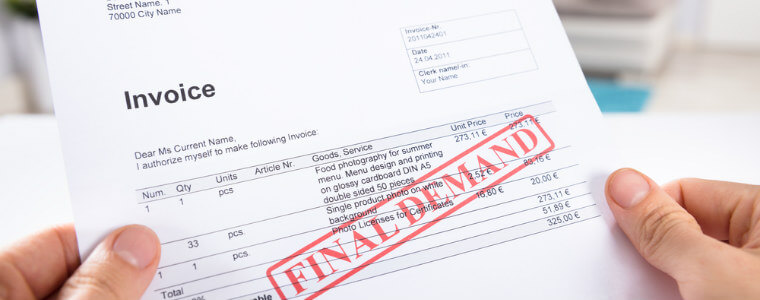It’s a simple enough concept – you’ve done work for a client, and now, you want to get paid.
Anyone who is in business knows the sinking feeling that creeps in when dealing with a shady client who doesn’t seem like they are going to pay their invoice. The experienced business owner also knows the consequences when more than one client ignores an invoice, starts making excuses, or goes silent at the same time. These consequences include interrupted cash flow and the inability to pay employees, suppliers, vendors, and investors.
If you are facing a non-paying client, you probably want a quick resolution, but you don’t want to gain a bad reputation that might scare future clients away. This is where a skilled breach of contract lawyer in Houston like Seth Kretzer can help you collect your unpaid invoices through a variety of techniques.
Reasons to File a Lawsuit for Non-Payment of Services
There are several reasons to sue a client for not paying bills due and owing to your business. Most notable of these reasons is that your business has wasted time and effort to provide services to one client, most likely at great time and expense, to the detriment of other clients (because no one can be everywhere at once!)
Besides wasted time and effort, businesses often have to waste resources to collect payment. Just think about all of the invoices, the demand emails, and the tense negotiation about whether and for how long your business can or will continue to provide services in the future when a client owes you money from the past. Another reason is lost business opportunities from other clients. Finally, many backed-up and unpaid invoices can hurt your business’s bottom line. As a result, some businesses suffer to the point of needing to suspend certain activities, close the business, and in extreme cases, file for federal bankruptcy protection.
Considering all of the expenses already in play with a non-paying client, you may want to try to sue a client yourself to save some money. But the help of a lawyer is recommended as business lawsuits are often based on express and implied contractual terms. Therefore, you need an experienced attorney who understands the nuances of business contracts and will fight tirelessly to ensure you are paid what you are owed. In addition, your attorney will be able to provide such assistance as:
- Evaluating the facts and evidence of your case
- Creating a road map for the case
- Negotiating for a settlement, both before litigation and during litigation, at strategically important junctures
Before Suing for Non-Payment of Services
When you suspect an invoice hasn’t been paid, the first step is to make sure that you followed all the right procedures and provided all the necessary information to your client so you could get paid.
For example, did the invoice go out on time and to the right contact person? Was the scope of work clearly outlined in a written or verbal contract, and was it actually performed? Was the rate of pay for services clearly established? Was the method for making payment clear?
If the answer to all these questions is yes, and you didn’t get paid, the next step is to think about your relationship with the client and what sort of “gentle reminders” you can send to the client to encourage payment.
If payment still isn’t forthcoming after the reminders, conduct a simple cost-benefit analysis where you consider whether the costs of suing are greater or less than the amount of money that you are seeking from your client.
Sometimes (and occasionally, you will have a client who counts on this), it is a cheaper option to simply take the loss. An important factor to consider in your analysis is business goodwill; your client will probably not like you very much after you’ve sued them and may tell other potential clients or blast your reputation negatively on social media.
1. Follow up Multiple Times
If you’ve sent multiple e-mails or letters requesting payment, and these reminders seem to be either getting lost in the spam folder or getting ignored, you should try phone calls before giving up.
Keep accurate notes on when you called, who you spoke with, and what was discussed. Be friendly but assertive with your client and try to get the client to commit to future payments being made on specific dates. This will give you a reason to call again and remind the client of their renewed promises to you.
If you are willing to, you may wish to work with your client to enter a payment plan for the unpaid invoice where payments are made over several weeks or months.
2. Send a Final Demand Letter for Payment of Services Rendered
If more time has passed than you are willing to let pass without payment, you should send a demand payment letter before you sue. Although the legal letter for non-payment of the invoice precedes the lawsuit, you should be ready to file a lawsuit if you need to. The Final Demand Letter will likely become a key piece of documentary evidence when you do.
Attorney Seth Kretzer, who has worked with many businesses demanding unpaid invoices, can help you draft a sample demand letter for payment of services rendered as well as get your complaint on deck should you need to take legal action for non-payment. Contact the Law Offices of Seth Kretzer today for more help.
The tone of the letter of demand for outstanding payment should demand payment immediately and give the client the option to call you and work out a payment plan. It should also explain to the client convenient ways to pay online. The Final Demand Letter should include important details such as:
- The amount owed;
- Any interest or late fees on the amount owed;
- Where payment should be made;
- When payment should be made by;
- That this is the final opportunity to make payment.
At this point, your legal notice for non-payment of the invoice should set a hard deadline for complete payment. You should let the client know that if payment is not in your accounts receivable by that date, then a collections attorney will be contacting them, and legal action will be taken.
3. Consider the Damages and Likelihood of Recovery
Suing a client for non-payment is a serious thing. It could damage the reputation of the business you are in a dispute with, as well as the reputation of your own business. It will also take up valuable time you could be working at generating new revenue rather than chasing down old debts. For this reason, it is critical to speak with a collections attorney before jumping into a lawsuit.
Before you initiate the legal process to collect a debt, you need to make an important business decision – is it worth the cost of litigation to pursue? This is the cost-benefit analysis we discussed above.
Also, we recommend that you think about the financial health of your non-paying client if you have access to this type of information. For example, has the client been telling you that their business is deep in debt? Is it possible they are preparing to file for bankruptcy? Do they have any fixed assets, liquid cash, real property, or accounts receivable of their own?
Depending on how you answer these questions, you may be better off working with your attorney to settle the invoice, even if you must take less than you are owed.
How to Sue for Non-Payment of an Invoice
Under Texas law, filing a lawsuit for nonpayment of an invoice is essentially suing for “breach of contract.” The elements of a breach of contract claim are:
- The existence of a valid contract;
- Performance by the plaintiff;
- Material breach by the defendant;
- Damages sustained by the plaintiff as a result of that breach.
In order to turn your dispute over an unpaid invoice into a lawsuit, you will need to prepare your evidence – including the original invoice, proof that the services were provided, and records of any attempts to collect the payment owed – and state your claim in a document called a complaint, which is filed with the court in the county in which your customer either resides or does business.
When to Sue in Texas Justice Court
There are two courts you may wish to bring your breach of contract lawsuit in – the Justice Court and the District Court. Justice Court, also known as the small claims court, exists for the purpose of resolving simple disputes quickly and economically and is considered a court of limited jurisdiction, allowing claims for dollar amounts of less than $10,000.
In Justice Court, judgment is usually rendered immediately or promptly after the hearing. The justice court is more informal than the district court or county court and does not require the same extensive knowledge of the law or court rules and procedures. Parties do not have to be represented by attorneys in Justice Court, though it is recommended that you work with a breach of contract attorney who can help you make the best case possible.
When to Sue in Texas District Court
Texas District Court, which is a civil trial court, has something called concurrent jurisdiction with the Justice Court, meaning claims between $200 and $10,000 for breach of contract can be brought before this court. Claims over $10,000, however, must be brought before the District Court in the first instance.
District Court claims require knowledge of the laws, procedures, and presentation of evidence in conformity with the Texas Rules of Evidence. Although the state allows it, this is not a recommended place for a plaintiff to pursue their unpaid invoice pro se.
The stricter processes of the District Court necessitate the need for assistance from a capable attorney.
1. Serve a Complaint
After you file your complaint in Justice Court or District Court, there are ways to seek relief early in the process. For example, you could apply for a writ of attachment or writ of possession to either place a lien on some of the defendant’s assets or to take possession of them (if they were collateral in the underlying agreement). This can protect your ability to collect on a judgment while also pressuring the defendant to settle the case.
2. Default Judgment
If the party you are suing doesn’t appear in court after receiving proper notice of your complaint and a scheduled trial date, you will win by something called “default.” After receiving your default judgment, you will have a court judgment that has the full force of law and which will be enforceable even if the defendant moves to another state.
3. Obtain a Judgment
If your case is not granted a default judgment, it may still be resolved before trial by something called Summary Judgement. Under Texas Rule of Civil Procedure 166a, in certain circumstances, your attorney can make a motion to the court which shows that there are no facts in dispute, and you are entitled to a favorable judgment against the defendant without the need for a trial.
Otherwise, your attorney will help you make a case for justice before the judge or jury, showing such things as the existence of a contract between you and your client, your rightful performance of services, and the client being unable or refusing to pay you what they owed you. If the judge or jury awards judgment in your favor, this again will result in a document with the full force of law against the defendant.
Once a judgment is obtained, you can immediately start the process of enforcing it, including filing an abstract of judgment, which permits liens on real and personal property, and a writ of execution, which can be used by the sheriff to seize equipment, inventory, or cash on your behalf to satisfy the judgment amount. Contact an experienced judgment liens lawyer in Houston, like attorney Seth Kretzer, for more help.
4. File a Writ of Possession
One of the ways to expedite the return of your unpaid invoice when the unpaid invoice is related to occupied property is a Writ of Possession. A “writ” is an order from the court where an official under the court’s authority takes action, such as enforcing an eviction.
Writs of Possession in Texas are governed by Section 24.0061 of the Texas Property Code and by Rule of Civil Procedure 510. Both provisions provide that a plaintiff in an eviction action has a right to have a Writ of Possession offered to allow them to take back possession of their leased premises. If your unpaid invoice is for office space, warehouse space, or similar, our office can help you get your property back with a Writ of Possession.
5. File a Writ of Attachment
A Writ of Attachment, like a Writ of Possession, is a court order that works to preliminarily seize property from a defendant to force compliance with a decision that may be obtained in a pending lawsuit. Before a final judgment is issued, the court may order the sheriff or other officers to seize any property belonging to the defendant to satisfy the claim that the plaintiff has against him.
Texas Civil Practice and Remedies Code Section 61.001 governs the issuance of a Writ of Possession under circumstances where the defendant is justly indebted to the plaintiff, the attachment is not being sought to harass the defendant, and the debt must be secured to protect the rights of the plaintiff.
Do You Need a Lawyer to Sue for Non-Payment of Services?
If you have an unpaid invoice from a client, you will want a lawyer with experience recovering money owed from unpaid invoices. Alternatively, if a judgment has been made against you relating to an unpaid invoice, we can help you negotiate your post-judgment amount to make more manageable payments.
When a client takes your services and doesn’t pay the bill, it can be incredibly frustrating. At the Law Offices of Seth Kretzer, we are businesspeople too—we get it, and we want to ensure that you are paid every last cent you are owed.
Contact us today for assistance.






